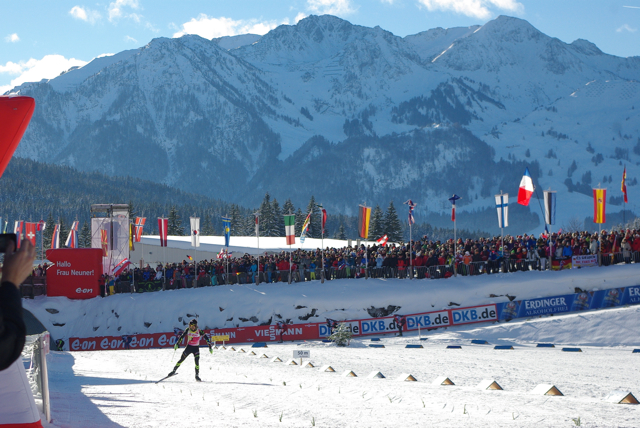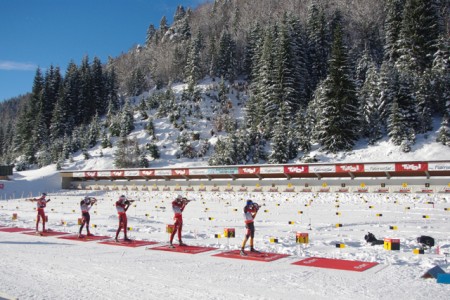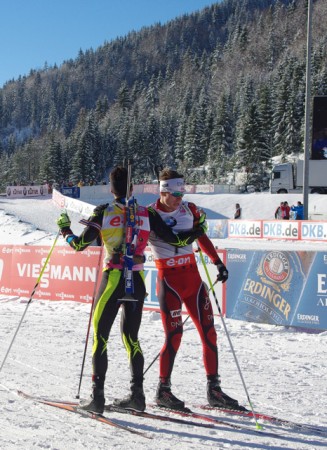
HOCHFILZEN, Austria – Give Martin Fourcade an opening, and he’ll slam the door on you.
The best biathlete in the world last year, the French star was hampered in Friday’s sprint when a mid-race snowstorm put most of the field at a huge disadvantage against the earliest starters. Despite clean shooting, he placed second behind Norway’s Lars Berger, who had two penalties but a low bib number. At the time he seemed unconcerned, and said he was simply happy for Lars Berger, a veteran in need of a boost.
Fourcade showed in today’s 12.5 k World Cup pursuit why second place in the sprint was just fine with him. As soon as Berger faltered, missing shots in the first standing stage, Fourcade took off. He then cleaned his final targets and skated off to victory.
“My plan was to catch the lead and then do kind of training, to do what I have trained to do,” Fourcade said.
He was patient through the early stages of the race, stealing a second here or there from Berger but never putting himself under as he tried to make it to the front. By the time Berger came in for the first standing stage, Fourcade was just behind him and the pair had a slight gap to the rest of the field.
Fourcade missed one shot, but Berger missed two – and so did some of the other racers who were in pursuit, like Berger’s teammates Tarjei Bø and Ole Einar Bjørndalen. Even after skiing a penalty loop, Fourcade was out in front. He had a 12-second lead on Simon Schempp of Germany, which he extended slightly on the next loop. But Schempp was caught by a fast-moving train of Norwegians Emil Hegle Svendsen, Bø, and Berger, along with Christoph Sumann of Austria.

The group, a sea of red suits, was popular – maybe more so than Fourcade. As Bjørndalen skated by every new group of spectators out on the course, he was greeted by chants of his name: “Ole! Ole! Ole!”
Although he has made mistakes late in the game at other points so far this season, Fourcade was cool and collected as he knocked down his last set of targets.
“The guys close to me showed me in every way that I have to be really strong to hope to win,” he said. “I did it today, but since my shape wasn’t wonderful I had to shoot clean. On my last shooting I was really thinking to just shoot clean because I didn’t want to fight with Emil and Tarjei on the last loop.”
Fourcade cruised around the final loop, before raising his arms in victory as he neared the finish line. After crossing it, he took a bow. It was a familiar sight: this is Fourcade’s 27th World Cup victory, a remarkable tally for a 25-year-old.
While Fourcade was secure in his victory, the real fight was unfolding behind him. Berger, usually not the most reliable on the range, missed another three shots in the final standing stage and fell from contention. That left the group of chasers to to fight it out amongst themselves. Schempp also collected a penalty, but Svendsen, Sumann, and Bø all cleaned – in that oder.
Svendsen shot out of the stadium like a rocket, quickly extending his four-second lead on Sumann. Last year’s World Cup runner-up and double World Champion, he continued to hammer around the final loop and coasted across the finish line eight seconds behind Fourcade.
It was a relief for the Norwegian, who did not have a good start to the season in Östersund, Sweden, last week.

“Sometimes you’re not in the zone that you want to be in,” Svendsen said of the season’s start. “Last week the whole team was not at our normal level. This is sometimes the way it is without any logical explanation, that you are just not very good. Things go up and down and we cannot always plan when we are in shape. I am happy to be back.”
Sumann was the great hope for the home Austrian team, which had not yet had a podium in the weekend of racing. They had come close: Sumann was fifth in the sprint, and the men’s relay team was in third going into the final leg when veteran Simon Eder was simply unable to ski fast enough on the final loop to hang on to the podium.
Unfortunately for the home team, it was a repeat performance by Sumann today.
“In fact was pretty confident to take him,” Bø said. “Of couse, you never know with Sumi, but when I saw the results from the last competitions I knew he was not in his best shape. So I was confident about that.”
Sumann dropped through the rankings, and ended up finishing seventh; he lost 20 seconds over the final 2.5 kilometers.
“I was was more concerned with the guys behind, that they would catch me,” Bø said.
But he hung on for third, just barely, despite a fiery last lap by Evgeniy Ustyugov of Russia (who finished fourth after moving all the way up from 17th) and Bjørndalen. That made a very familiar podium: Fourcade won the last two World Cup Total Scores, Bø the one before that, and Svendsen the one before that.
This year, Fourcade is out to an early lead after winning twice in Östersund. Today’s victory makes him three for four in individual races this season. And his lead will only grow: Svendsen and Bø will sit out next weekend’s races in Annancy Le Grand-Bornand, France. It is the first time the World Cup will visit the venue.
“I have done some good advertising in France the last few weeks,” Fourcade said of finally getting to race on home turf. “I am sad because these guys on the podium with me today will not be there, and I think the French fans will miss that a lot.”
Bø showed mixed feelings about missing out on the French races.
“I would love to keep completing because I am in good shape, but it is not about the yellow bib for me this season,” he said, referring to the Total Score. “Of course we love to compete, but this year for me, it is all about the Olympic Games. And it’s at some 1500 or 1600 meters. For us maybe the preparations are a little different than for Martin who was born in the mountains and lives there in France. So maybe we need to prepare a little differently to be ready.”
The Norwegians will visit Seiser Alm, a high-altitude training site in Italy, in order to prepare better for Sochi. Fourcade may seem unstoppable now, but they believe that training at elevation will give them a chance to beat the Frenchman when the Olympics roll around.
“I have just decided to put in a couple of weeks of training,” Svendsen said. “It’s important with the Olympics to be well prepared. I wanted to do this this year, not to compete too much before Christmas and have some extra training.”

Chelsea Little
Chelsea Little is FasterSkier's Editor-At-Large. A former racer at Ford Sayre, Dartmouth College and the Craftsbury Green Racing Project, she is a PhD candidate in aquatic ecology in the @Altermatt_lab at Eawag, the Swiss Federal Institute of Aquatic Science and Technology in Zurich, Switzerland. You can follow her on twitter @ChelskiLittle.



